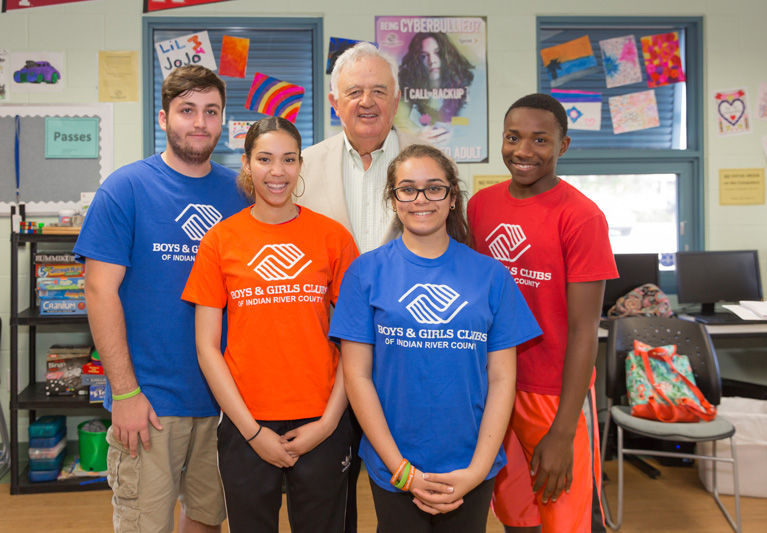
The Boys and Girls Clubs of Indian River County has received a major boost from John’s Island resident George Higgs with a $250,000 bequest toward a new career preparatory program aimed at exposing teens to potential career paths, helping them discover their strengths and interests, and ensuring they graduate high school with a solid plan for their future.
Launched at the Vero Beach Club thanks to a $10,000 gift from the Hauser Family Foundation, they hope to eventually offer the Destinations program to all high school members.
“Our educational system has shifted from preparing students for careers by aptitude to preparing students for college,” says BGC executive director Elizabeth Thomason. “Not all students have the capacity for college, so why should they saddle themselves with debt, wasted time and generic degrees that do not lead to gainful employment? With shortages in the trades and manufacturing, I hope we see a resurgence of vocational training in high school.”
“I’ve been involved with the Boys and Girls Club for over 40 years. I’m a passionate believer in what they do to help young people,” says Higgs, adding that in recent months he and BGC Foundation Board member Barry Wiksten pondered a number of issues, including:
What can we do to help improve the lives of the young people after they leave the Boys and Girls Club?
How can we encourage them to stay through high school?
How can we help them to develop a career path for a decent middle class living?
One way is to broaden the number of career options, with program participants being offered tours of the Indian River State College, which provides affordable vocational and technical training in areas such as Industrial Education, Fire Science and Law Enforcement, Culinary/Hospitality and Office Administration.
“There are so many jobs in those fields that go unfilled. That’s the logic behind getting this initiative started,” says Higgs. “A lot of these jobs pay more than college-trained jobs. Some of these kids go through four years of college and you see them in jobs making very little money. And some kids get out with a debt they never can repay.”
They have also discussed promoting internships in various trade industries.
“One area that comes to mind is construction,” says Higgs, who has spoken with building contractor Toby Hill of The Hill Group about reviving the construction-related internships once offered through the Builders Association. Higgs says he also recently noted a sign advertising “electricians needed” on the side of a truck.
“Now these are $50,000, $60,000 jobs and they can’t fill them because they don’t have the trained people. And that’s true of almost all the trades,” states Higgs. “There are a lot of young people here who could earn a nice middle-class living in these positions. We have to connect the dots. Another one would be hospitality, which is big all through the Treasure Coast. Hundreds of workers are brought in from Eastern Europe to fill these jobs. Something isn’t right about this. If we have hundreds of kids here without jobs, it just doesn’t make sense that we can’t train people here who are capable of doing those jobs.”
Thomason hopes to eventually hire a dedicated staffer to assist teens to navigate a national career planning database, write resumes, complete job applications, and apply for scholarships and grants. They could also help with job interviews through role playing exercises, arrange for speakers and job shadowing, and provide continued counseling support even after they get the job.
“We all know that the poverty level here is incredibly high; it’s such a disconnect with the barrier island,” adds Higgs. “But many of these people, if given a chance, are going to do well. The program could grow but it’s going to need some funding.”
Higgs started his long-term relationship with the Boys and Girls Club in the early 1970s when he founded Carex, a manufacturer of health care products, and opened a factory in a severely impoverished area of Newark, N.J.
“A lot of the kids needed a program to keep them off the streets. I met many lawyers and all who said the Boys and Girls Club saved their life. It was a rough environment. If they hadn’t had the Boys and Girls Club they would have been drug dealers or something,” he explains. “It was in the inner city and I felt some obligation to try to help them. We have much the same situation here. We need to try to help them; teach them so they can help themselves.
“And I think the Boys and Girls Club probably does a better job than anybody. Most of these people want the same things we do; they want a chance for a better life. I know firsthand what a tremendous role the Boys and Girls Club can play in a young person’s life. It makes a huge difference. They have a place to go after school instead of being on the streets.”
“With Mr. Higgs’ generous bequest and the Destinations program, we can help our kids make informed choices about the best career path to achieve their goals,” Thomason adds.



